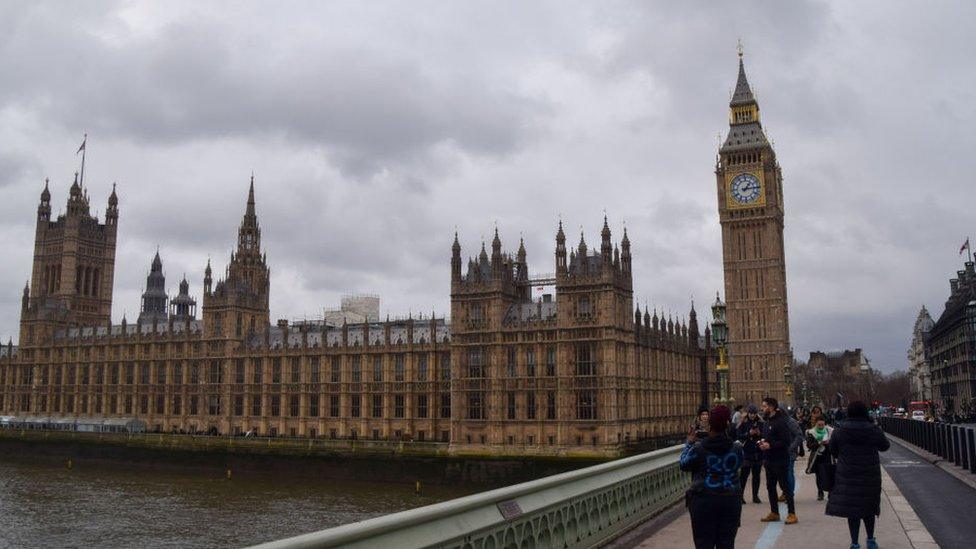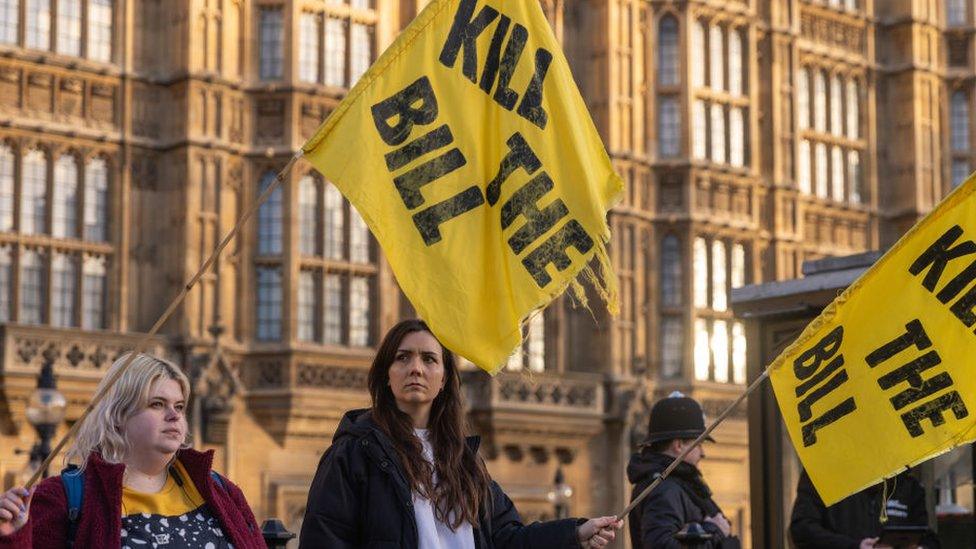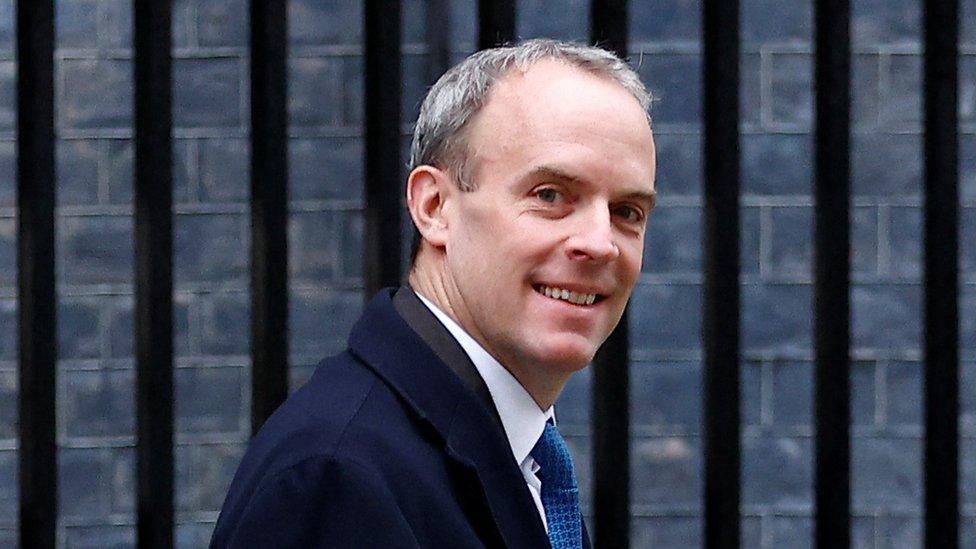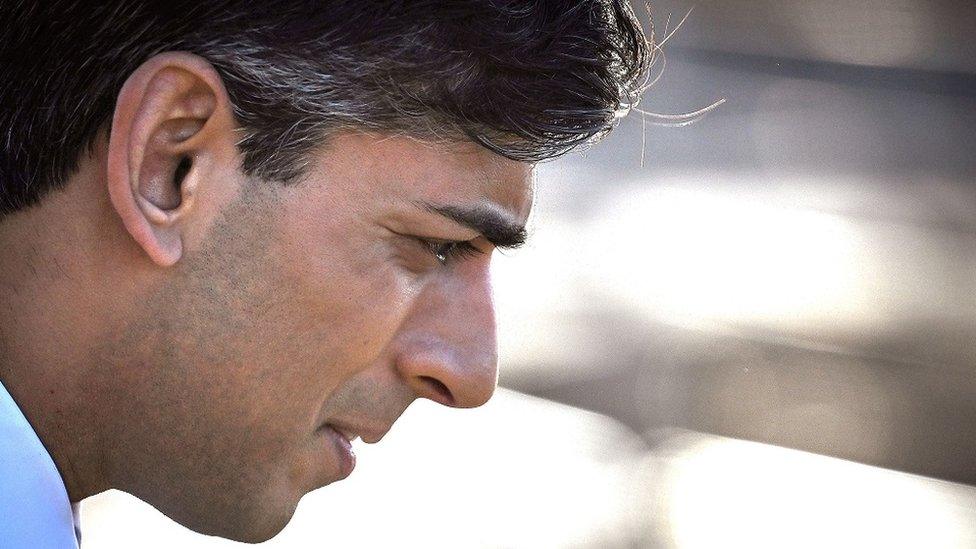What's happening in Parliament this week?
- Published

It's a week of routine, although important, legislating in Westminster - but listen out for the backbeat.
There's the personal, the rumblings around Dominic Raab and the aftershocks of Nadhim Zahawi's departure from government; the high political, with a possible but politically delicate agreement on the Northern Ireland Protocol in prospect; and, in the slightly deeper undergrowth, a Budget taking shape.
And there's certainly a strong Conservative faction who want tax cuts and will not be happy with steady as she goes from Chancellor Jeremy Hunt.
Thursday's backbench debate on former minister Chris Skidmore's proposed net zero strategy could see another set of Tory tensions emerge into the open.
In the Lords, peers are already teeing off against key provisions of the Public Order Bill, and will this week lay the groundwork for a serious attempt to gut the Retained EU Law Bill, setting up two serious clashes with the government, and the prospect of more to come.
My eye has also been caught by this week's Petitions Committee debate, on long waits for diagnosis for conditions like autism and ADHD (on Monday).
Petitions debates attract some of Parliament's biggest online audiences and can provide a way of crowbarring public concerns that have failed to catch politicians' attention, into the Westminster agenda. So watch this space.
Monday 6 February
Commons: After Home Office Questions (14:30), any urgent questions or government statements from 15:30.
The main debate will be on the annual motions to uprate social security benefits and the state pension.
There's also a motion to uprate the Charter for Budget Responsibility, which governs the Office for Budget Responsibility - normally a routine, technical matter.
Westminster Hall: From 16:30 there will be a debate on e-petitions 589677 and 597840, on assessments for autism and ADHD, external. The Petitions Committee commissioned a survey, which received 7,340 responses, following complaints of unacceptable delays in diagnosis for both conditions.

MPs want to know why the founder of the Russian mercenary Wagner Group was exempted from UK government sanctions to sue a journalist
It found that around half of those awaiting assessments had considered paying for private healthcare to speed up their diagnosis.
Committees: From 16:00 Foreign Affairs takes evidence on the shadowy Russian mercenary organisation, the Wagner Group and its proxy Private Military Companies, from Europe Minister Leo Docherty. Expect questioning on how and why the Treasury allowed Wagner Group founder Yevgeny Prigozhin exemption from sanctions to pursue a libel action against a Bellingcat journalist.
Public Accounts (16:00) have a session on the government's security vetting system - where delays are said to be causing gridlock in key civil service appointments, leading some people to walk away from government jobs.
Lords: From 14:30 the main event is peers' first debate on the Retained EU Law (Revocation and Reform) Bill - the measure which seeks to remove the remaining laws inherited from the EU by the end of the year. There are concerns around whether this can be done in such a short time, and the powers given to ministers.
There's already a long list of peers down to speak, including Lord Heseltine and Lord Frost. They may provide the Remainer-Brexiteer pyrotechnics, but watch out for the judges and the super-lawyers, the key swing voters who could send the bill back to MPs minus many of the powers it currently includes.
The Lords' influential Delegated Powers Committee has just issued a report proposing that the "cliff edge" clause under which EU-derived law will cease to have effect at the end of December, and the clause giving ministers powers to rewrite those laws, should be removed. Which wouldn't leave much.
Labour have put down a "regret motion" spelling out their concerns; it won't be pushed to a vote, but is designed to rally cross-party opposition in the detailed debates to follow.
Tuesday 7 February
Commons: After Treasury Questions (11;30), Labour's Sir Chris Bryant will introduce a ten minute rule bill, proposing that the government has the power to seize assets owned by Russian oligarchs, for use reconstructing Ukraine.
The main debate will see MPs zip through the remaining stages of the Seafarer's Wages Bill - which aims to ensure that minimum wage legislation applies to seafarers operating from UK ports.
Then they will turn to Lords amendments to the Higher Education (Freedom of Speech) Bill. The main issue here is that peers removed a right to sue higher education institutions for infringements of free speech, and the government will seek to reinstate it.
Westminster Hall: Work and Pensions Committee Chair Sir Stephen Timms has a debate (09;30) on saving for later life, following a recent report from his committee, external. He will ask new pensions minister Laura Trott what plans the government has to beef up auto-enrolment to pension schemes, to ensure there is adequate saving into the UK pension system.
Committees: Treasury (09:45) questions the UK's 'big four' banks on savings rates, the mortgage market, bank branch closures and financial services regulations. Issues will include why basic savings accounts pay interest as low as 0.5% and 0.65%.

Campaigners protest against the Public Order Bill outside the House of Lords
Digital, Culture Media and Sport (10:00) recall BBC chairman Richard Sharp to talk about the circumstances surrounding his appointment by Boris Johnson, which were not covered in his January 2021 pre-appointment hearing.
Lords: From 14:30 the main event is the second day of report stage debate on the Public Order Bill.
Peers will debate amendments on deleting proposed powers to stop and search without suspicion (a cross-party effort led by Labour's Lord Coaker and the Lib Dem Lord Paddick); protecting journalists reporting on demonstrations (Labour's Lady Chakrabati, with cross-party support); and narrowing the circumstances in which proposed Serious Disruption Prevention Orders can be used (a battery of detailed changes proposed by Crossbench peer and former reviewer of terrorism legislation Lord Anderson, and supported by Labour), including preventing the pre-emptive use of SDPOs on people who have not been convicted of anything.
The government has already lost two votes in previous debates and will be whipping hard to avoid more; in particular they don't want to lose new clauses tightening the rules on public processions, because they can't be re-introduced in the Commons if peers don't approve them.
Wednesday 8 February
Commons: Northern Ireland Questions (11;30), followed at 12;00 by Prime Minister's Questions.
Conservative Dr Caroline Johnson has a ten minute rule bill to ban the sale of disposable e-cigarettes.
The main debate is on approving central government grants to police and local councils in England. With a number of councils teetering on the brink of bankruptcy, this will see some MPs raising serious concerns.
Westminster Hall: Labour's Julie Elliott has a debate (16;00) on Women's Football Talent Pathways.
Committees: Transport (09:30) looks at the law around e-scooters.
Environmental Audit (13:30) quizzes Environment Secretary Thérèse Coffey on the latest government policy announcements.
Lords: From 15:00, peers will have an initial debate on the Economic Crime and Corporate Transparency Bill. Again look out for markers for amendments to toughen up the bill at a later stage.
Thursday 9 February
Commons: After International Trade Questions (09:30), the Leader of the House will deliver the weekly update on the forthcoming Commons agenda.
It's a day of backbench debates: first, on former minister Chris Skidmore's independent review of the government's net zero strategy, which sets out a road map to cutting the UK's carbon emissions. With a number of Conservative MPs strongly sceptical about net zero, this could see some interesting clashes.
Second, there will be a debate on parliamentary services for MPs
Committees: Treasury (09;30) has one of its regular sessions with Governor of the Bank of England Andrew Bailey, hot on the heels of the latest interest rate increase.
Lords: Peers (11:00) will debate the situation in Ukraine, featuring former Chief of the General Staff Lord Stirrup and former NATO Secretary-General Lord Robertson.
There will also be a long-awaited debate on a select committee report on a National Plan for Sport and Recreation, which recommended moving responsibility for sport to the Department of Health and Social Care, to encourage a healthier, more active population.
Neither House is due to sit on Friday 10 February - and Parliament then takes a half-term break, returning on Monday 20 February.
Related topics
- Published2 February 2023

- Published30 January 2023

- Published13 January 2023

